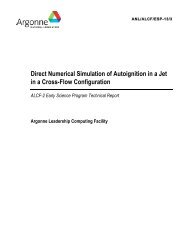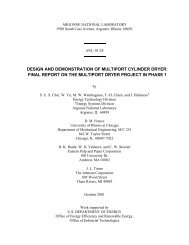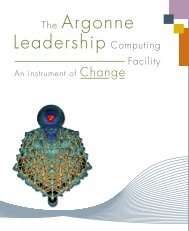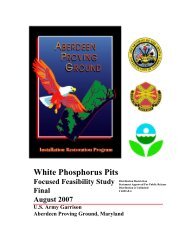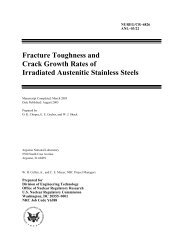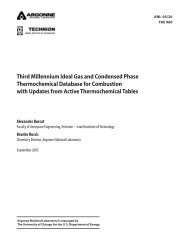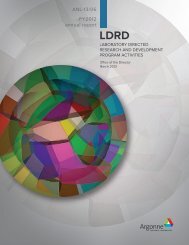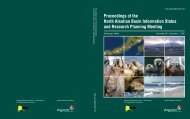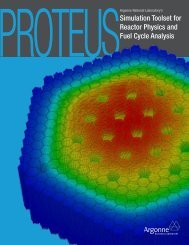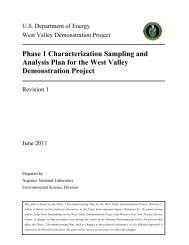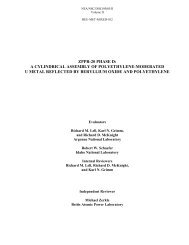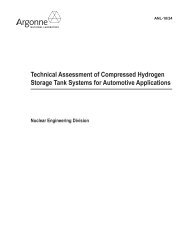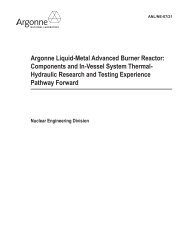ALCF Science 1 - Argonne National Laboratory
ALCF Science 1 - Argonne National Laboratory
ALCF Science 1 - Argonne National Laboratory
You also want an ePaper? Increase the reach of your titles
YUMPU automatically turns print PDFs into web optimized ePapers that Google loves.
<strong>Argonne</strong> Leadership Computing Facility<br />
argonne leadership computing facility<br />
Forefront Computational Center in Extending <strong>Science</strong> Frontiers<br />
Bold research that ventures into unexplored science frontiers is conducted at the <strong>Argonne</strong> Leadership Computing<br />
Facility (<strong>ALCF</strong>) through several initiatives. The Innovative and Novel Computational Impact on Theory and<br />
Experiment (INCITE), ASCR Leadership Computing Challenge (ALCC), Early <strong>Science</strong>, and Director’s Discretionary<br />
programs all provide avenues for scientists to conduct breakthrough science and engineering.<br />
Innovative and Novel Computational Impact<br />
on Theory and Experiment (INCITE) Program<br />
<strong>ALCF</strong> resources are available to researchers as part<br />
of the U.S. Department of Energy’s INCITE program.<br />
Established in 2003, the program encompasses<br />
high-end computing resources at <strong>Argonne</strong> and other<br />
national laboratories. The INCITE program specifically<br />
seeks out computationally intensive, large-scale<br />
research projects with the potential to significantly<br />
advance key areas in science and engineering. The<br />
program encourages proposals from universities,<br />
other research institutions, and industry. It continues<br />
to expand, with current research applications in areas<br />
such as chemistry, combustion, astrophysics, genetics,<br />
materials science and turbulence.<br />
ASCR Leadership Computing Challenge<br />
Program (ALCC)<br />
Open to scientists from the research community in<br />
academia and industry, the ALCC program allocates<br />
resources to projects with an emphasis on high-risk,<br />
high-payoff simulations in areas directly related to the<br />
Department’s energy mission, national emergencies,<br />
or for broadening the community of researchers<br />
capable of using leadership computing resources.<br />
Projects are awarded an ALCC allocation based on a<br />
peer review for scientific merit and computational<br />
readiness.<br />
Early <strong>Science</strong> Program (ESP)<br />
Allocations through the Early <strong>Science</strong> Program<br />
(ESP) provide researchers with preproduction hours<br />
(between system installation and full production) on<br />
the <strong>ALCF</strong>’s next-generation, 10-petaflops IBM Blue<br />
Gene system. This early science period provides<br />
projects with a significant head start for adapting<br />
to the new machine and access to substantial<br />
computational time. During this shakedown period,<br />
users assist in identifying the root causes of any<br />
system instabilities, and work with <strong>ALCF</strong> staff to help<br />
develop solutions. More than four billion core hours<br />
are allocated through ESP.<br />
Discretionary Projects<br />
Discretionary allocations are “start up” awards made<br />
to potential future INCITE projects. Projects must<br />
demonstrate a need for leadership-class resources.<br />
Awards may be made year round to industry,<br />
academia, laboratories and others, and are usually<br />
between three and six months in duration. The size<br />
of the award varies based on the application and<br />
its readiness/ability to scale; awards are generally<br />
from the low tens of thousands to the low millions of<br />
hours.<br />
1



